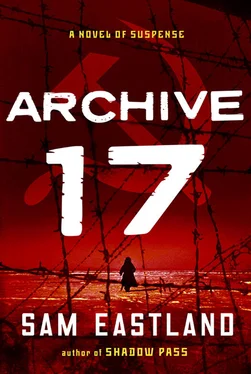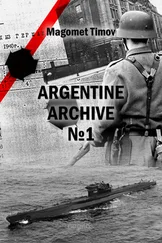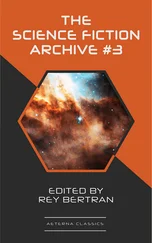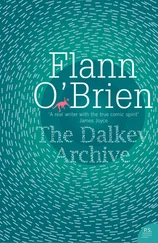Sam Eastland - Archive 17
Здесь есть возможность читать онлайн «Sam Eastland - Archive 17» весь текст электронной книги совершенно бесплатно (целиком полную версию без сокращений). В некоторых случаях можно слушать аудио, скачать через торрент в формате fb2 и присутствует краткое содержание. Жанр: Исторический детектив, на английском языке. Описание произведения, (предисловие) а так же отзывы посетителей доступны на портале библиотеки ЛибКат.
- Название:Archive 17
- Автор:
- Жанр:
- Год:неизвестен
- ISBN:нет данных
- Рейтинг книги:3 / 5. Голосов: 1
-
Избранное:Добавить в избранное
- Отзывы:
-
Ваша оценка:
- 60
- 1
- 2
- 3
- 4
- 5
Archive 17: краткое содержание, описание и аннотация
Предлагаем к чтению аннотацию, описание, краткое содержание или предисловие (зависит от того, что написал сам автор книги «Archive 17»). Если вы не нашли необходимую информацию о книге — напишите в комментариях, мы постараемся отыскать её.
Archive 17 — читать онлайн бесплатно полную книгу (весь текст) целиком
Ниже представлен текст книги, разбитый по страницам. Система сохранения места последней прочитанной страницы, позволяет с удобством читать онлайн бесплатно книгу «Archive 17», без необходимости каждый раз заново искать на чём Вы остановились. Поставьте закладку, и сможете в любой момент перейти на страницу, на которой закончили чтение.
Интервал:
Закладка:
Vassileyev’s lectures were filled with such apparent contradictions that Pekkala began to feel as if he would never master the subtle skills which Vassileyev was trying to teach him .
Then, one day, only minutes after he had arrived in the marketplace chosen for that week’s Field Exercise, Pekkala spotted Vassileyev. The old man was wearing a short double-breasted wool coat and sitting on an upturned barrel with a porter’s trolley beside him .
“How did you do it?” asked Vassileyev, as they sat down to lunch at one of the market restaurants, its floor strewn with sawdust and the tables covered with brown paper .
“I don’t know,” Pekkala replied honestly. “I wasn’t even concentrating.”
Vassileyev thumped Pekkala’s back. “Now you understand!”
“I do?”
“Our life’s work is to sift through the details,” his mentor explained. “And yet sometimes we must learn to ignore them, so that the bigger picture comes into focus. Do you see now?”
“I am beginning to,” he answered .
For their final exercise, Vassileyev promised Pekkala his hardest task yet .
That day, as he wandered up and down Morskaya Street, Pekkala studied the faces of everyone he passed, searching for some chink in the armor of their disguises. But he found nothing .
Then, just as he was about to give up, he spotted Vassileyev. The man had been sitting on a bench the whole time. Pekkala had walked past the bench at least a dozen times and never even seen Vassileyev. It was as if he had become invisible .
But the most incredible thing about it was that Vassileyev had not put on any disguise at all. He had simply been himself. And Pekkala, searching for anyone but the man he recognized, had failed to see him .
“Sometimes,” said Vassileyev, “the most effective place to hide is in plain sight. Only when you have learned to conceal yourself are you ready to see through the disguises of others. The most dangerous thing is not the face that remains hidden”-Vassileyev passed a hand before his eyes-“but what hides behind that face.”
“I didn’t think I’d ever need a bodyguard,” said Pekkala.
As Savushkin pulled on his torn shirt, he looked down at the mangled corpse. “Neither did I, until now.”
“What enemies did you make to draw such a wretched assignment as this?”
Savushkin’s face brightened. “No enemies at all, Inspector. I volunteered for this!”
“Volunteered? But why?”
“For the chance to tell my children I once served beside the Emerald Eye.”
“I’m glad you are here, Savushkin.”
Savushkin grinned, but then his face became serious. “A word of advice, Inspector. In the days ahead do not place your faith in anyone. Anyone! Do you understand?”
“I think I can trust you, Savushkin. You just saved my life, after all.”
Before Savushkin could reply, the urgent wail of the locomotive’s whistle summoned them back to the train.
The two men watched as the wagon doors slid open and prisoners began to climb aboard.
“Looks like we’re not spending the night here after all,” remarked Savushkin, as he kicked a blanket of snow over the body which lay at their feet.
They raced across the field, waving and shouting.
“Why,” asked Pekkala, fighting for breath as the cold air raked at his throat, “did you keep asking me who I was if you already knew?”
“It gave me an excuse to stay close to you,” gasped Savushkin. “Besides, I knew they were safe questions to ask.”
“And how did you know that?” asked Pekkala.
“Because you’d never have told me, Inspector.”
They climbed aboard just as the train began to move.
The railroad siding slipped away into the grainy air. In the distance the grove of trees seemed to disintegrate, atom by atom, until it too was gone.
If anyone even noticed the absence of the knife-cut man, nobody mentioned it. With a shuffling of feet, the space he had once occupied was filled, as if he’d never been there at all.
As wagon #6 swayed rhythmically from side to side, with the clatter of its wheels like a heartbeat echoing across the countryside, the atmosphere inside it was almost peaceful.
“Poskrebyshev!”
“Yes, Comrade Stalin.”
“Have there been any messages from Pekkala?”
“No, Comrade Stalin. He has not yet arrived at the camp.”
“You must keep me informed, Poskrebyshev.”
“Yes, Comrade Stalin.” Poskrebyshev stared at the gray mesh of the intercom speaker. Some of the tiny holes were clogged with dust. There had been a particular tone in Stalin’s voice just then, an anxiety almost bordering on fear. I must be mistaken, he thought.
Ten days after its departure from Moscow, ETAP-1889 passed through the town of Verkneudinsk.
This was the last civilian outpost before the train’s course diverted from the Trans-Siberian Railroad onto a separate track that would bring it to the Borodok railhead.
Peering through the opening, Pekkala spotted two men standing outside a tavern which adjoined the Verkneudinsk station. Faintly, he heard the men singing. Tiger stripes of lamplight gleamed through bolted window shutters, illuminating the snow which fell around them.
Afterwards, while the train pressed on into a darkness so utter it was as if they’d left the earth and were now hurtling through space, the singing of those two men haunted him.
The following morning, the train arrived at Borodok.
One final time, the prisoners climbed from their wagons, past shouting guards and dogs on choke-chain leashes, and were herded into a lumberyard where thousands of logs had been stacked as high as double-storied houses, waiting to be shipped to the west on the same train which had delivered the prisoners. The air smelled sour from the wood, and piles of shredded bark steamed in the cold, melting the snow around them.
In one corner of the yard, behind a wire fence, stood a mountain of metal fuel drums, each one marked DALSTROY.
Pekkala wondered if those drums were already full, with dead men tucked like fetuses inside, or if they had been set aside for the prisoners who stood around him now.
A guard climbed up on top of the log pile. “There are many rules at Borodok!” he shouted, hands cupped around his mouth. “You will know what they are when you have broken them.”
The convicts stared at him in silence.
“Now strip!” commanded the guard.
Nobody moved. The convicts continued to stare at the guard, each one convinced that he must have misunderstood. The temperature was below zero and all they had on was the same threadbare pajamas in which they’d first boarded the train.
Seeing that his words had no effect, the guard drew a pistol from a holster on his belt and fired a shot into the crowd.
The entire group flinched. With the blast still echoing around the lumberyard, prisoners ran their fingers across their faces, down their chests and out along the branches of their arms, searching for the wound which every man felt certain he’d received.
Only then did someone cry out, a sound more of surprise than pain.
The crowd parted around one man, whose hands were clutched against his neck. With wide and pleading eyes, he turned and turned in the space which had been made for him.
Nobody stepped in to help.
Seconds later, the convict dropped to his knees. Slowly and deliberately, he lowered himself onto his side. Then he lay there in the dirty snow, blood pulsing out of his throat.
The guard called out again for everyone to strip. This time, there was no hesitation. Filthy garments slipped to the ground like the sloughed-off husks of metamorphosing insects.
Читать дальшеИнтервал:
Закладка:
Похожие книги на «Archive 17»
Представляем Вашему вниманию похожие книги на «Archive 17» списком для выбора. Мы отобрали схожую по названию и смыслу литературу в надежде предоставить читателям больше вариантов отыскать новые, интересные, ещё непрочитанные произведения.
Обсуждение, отзывы о книге «Archive 17» и просто собственные мнения читателей. Оставьте ваши комментарии, напишите, что Вы думаете о произведении, его смысле или главных героях. Укажите что конкретно понравилось, а что нет, и почему Вы так считаете.











